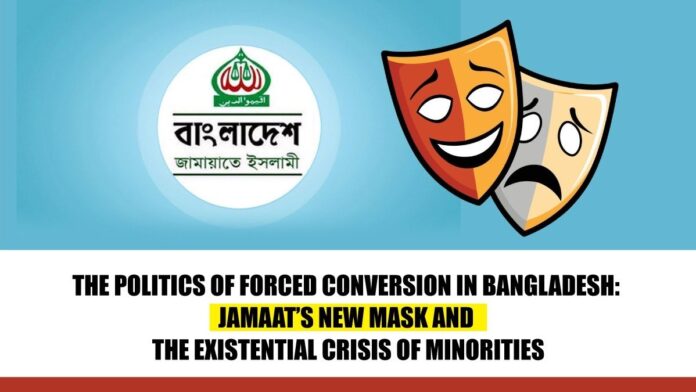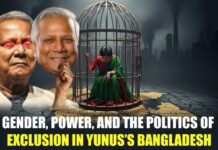
In Chapainawabganj, Bangladesh, yesterday, September 14, twenty-five members of the Sanatan (Hindu) faith formally joined Bangladesh Jamaat-e-Islami. This event was not merely a case of joining a political party but part of a planned program of religious conversion—something that has been Jamaat’s core agenda since its inception. Jamaat’s central committee member and former MP Professor Latifur Rahman himself admitted that this recruitment was the result of “dawati (proselytising) activities,” which, he said, will expand further in the future. In other words, it is clear that Jamaat’s goal is not just to increase its political membership, but to change Bangladesh’s religious fabric through conversion.
This activity is nothing new for Jamaat. Since its founding, the organisation has consistently pressured religious minorities to convert to Islam. After the riots of July, the situation of minorities in Bangladesh has become even more precarious. During the unrest, homes, temples, and businesses belonging to minorities were attacked, and threats were made to drive them out of the country. In this context, the dawati campaigns of groups like Jamaat act as an indirect ultimatum: convert to Islam, or perish.
Behind Jamaat’s activities lie foreign funds, the support of Islamic jihadist organisations, and backing from the military. In July, the elected government was ousted through nationwide riots, and power was seized illegally. At the heart of this takeover is the usurious moneylender Muhammad Yunus and his allied war-criminal group Jamaat. They have been subjecting Bangladesh’s religious minorities to persecution and pressuring them to convert.
Jamaat’s politics of conversion is not just a political tactic—it is a crime against humanity. It constitutes a direct assault on religious freedom and the rights of minorities. While the Constitution of Bangladesh guarantees freedom of religion, in reality minorities today live in insecurity. Jamaat’s dawati activities are part of a deliberate effort whose ultimate aim is to turn Bangladesh into a medieval-style Islamic state.
This raises urgent questions: Where will Bangladesh’s minorities go? What has happened to their right to religious freedom? Will Jamaat’s politics of conversion remain limited to Chapainawabganj, or will it spread nationwide? Since the July riots, persecution, violence, and conversion attempts against minorities have intensified. In this situation, Bangladesh’s minorities are now fighting for their very survival.



